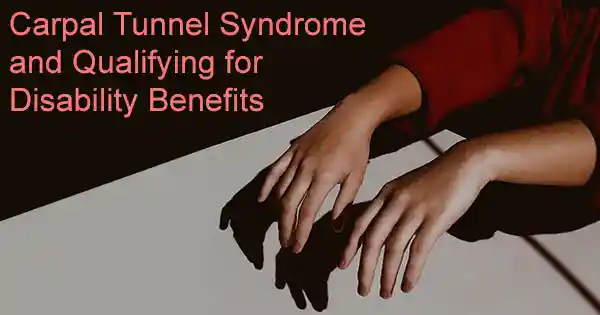Carpal Tunnel Syndrome and Qualifying for Disability Benefits
Can I get disability benefits if I am suffering from the effects of Carpal Tunnel Syndrome?
Author Attorney Greg Reed:
According to the America College of Rheumatology, carpal tunnel syndrome (CTS) may be the most common nerve disorder affecting Americans today with 4-10 million people experiencing some level of CTS.
Older people and women are more likely to experience the condition which causes pain, numbness and tingling in the hands and fingers. Carpal tunnel syndrome is usually quite treatable and resolves within one year, making it difficult to qualify for Social Security Disability benefits.
Getting approved for Social Security Disability benefits with a diagnosis of carpal tunnel syndrome is not easy.

There is no specific impairment listing for carpal tunnel syndrome in Social Security’s Blue Book, however, you may be approved on appeal if your condition meets or equals the criteria of an impairment that is listed.
There is no specific impairment listing for carpal tunnel syndrome in Social Security’s Blue Book, and, in general, Social Security examiners do not consider the symptoms of carpal tunnel syndrome disabling.
However, you may be approved on appeal if your condition meets or equals the criteria of an impairment that is listed. Impairment listings that might be related to carpal tunnel syndrome include peripheral neuropathy, diabetes, arthritis, lupus, scleroderma, or kidney failure.
A confirmed diagnosis of carpal tunnel syndrome is helpful, but you must be able to prove that your limitations are so severe you are unable to work for at least one year.
In addition to your medical records and results of the tests described above, Social Security will evaluate your ability to perform a range of physical and mental activities and any limitations you experience resulting from CTS. This is known as residual functional capacity (RFC). People with CTS have trouble with tasks such as typing, picking up objects, or operating an adding machine or cash register. Even if the RFC concludes that you are able to work while sitting down, if you are unable to use your fingers, there may not be any jobs you can actually perform.
In order to qualify for Social Security Disability, you will need to satisfy a few specific requirements in two categories as determined by the Social Security Administration.
The first category is the Work Requirements which has two tests.
- The Duration of Work test. Whether you have worked long enough to be covered under SSDI.
- The Current Work Test. Whether you worked recently enough for the work to actually count toward coverage.
The second category is the Medical Eligibility Requirement.
- Are you working? Your disability must be “total”.
- Is your medical condition severe? Your disability must be “severe” enough to interfere with your ability to perform basic work-related activities, such as walking, sitting, and remembering.
- Is your medical condition on the List of Impairments? The SSA has a “List of Impairments” that automatically qualify as “severe” disabilities. If your disease is not listed this does not mean you cannot get disability, it means you must prove you cannot maintain employment due to your limitations.
- Can you do the work you did before? SSDI rules look at whether your medical condition prevents you from doing the work you did prior to developing the condition.
- Can you do any other type of work? If you cannot do your prior work, an evaluation is made as to whether you can perform any other kind of work.
More details can be found on our Qualifying for Disability page.
If you have carpal tunnel syndrome and believe you are eligible for Social Security Disability benefits, it’s best to consult a qualified disability attorney before applying.
An experienced lawyer can guide you through your qualifications and make sure your application has all the evidence necessary to support your claim.
Disability benefits are an important source of income for those who are unable to work. If you are not able to work due to accident or illness, you may be eligible for Social Security Disability or Long Term Disability benefits. If you have applied for benefits and been denied, contact the attorneys at Bemis, Roach and Reed for a free consultation. Call 512-454-4000 and get help NOW.
Author: Attorney Greg Reed has been practicing law for 29 years. He is Superlawyers rated by Thomson Reuters and is Top AV Preeminent® and Client Champion Gold rated by Martindale Hubbell. Through his extensive litigation Mr. Reed obtained board certification from the Texas Board of Legal Specialization. Greg is admitted to practice in the United States District Court - all Texas Districts and the United States Court of Appeals-Fifth Circuit. Mr. Reed is a member of the Travis County Bar Association, Texas Trial Lawyers Association, past Director of the Capital Area Trial Lawyers Association, and an Associate member of the American Board of Trial Advocates. Mr. Reed and all the members of Bemis, Roach & Reed have been active participants in the Travis County Lawyer referral service.

![]()
Your Free Initial Consultation
Call now:
At Bemis, Roach and Reed, if we can't help you, we will try to find the right attorneys for you.
We offer each of our prospective clients a free no obligation one hour phone or office consultation to see if we can help you and if you are comfortable with us. We know how difficult a time like this can be and how hard the decisions are. If we can be of assistance to you and help you find a solution to your issue we will even if that means referring you to another attorney.
Let's get you Started:
If you could provide us with some basic information about your claim we will get right back with you with a free case evaluation and schedule your Free Consultation Today.






